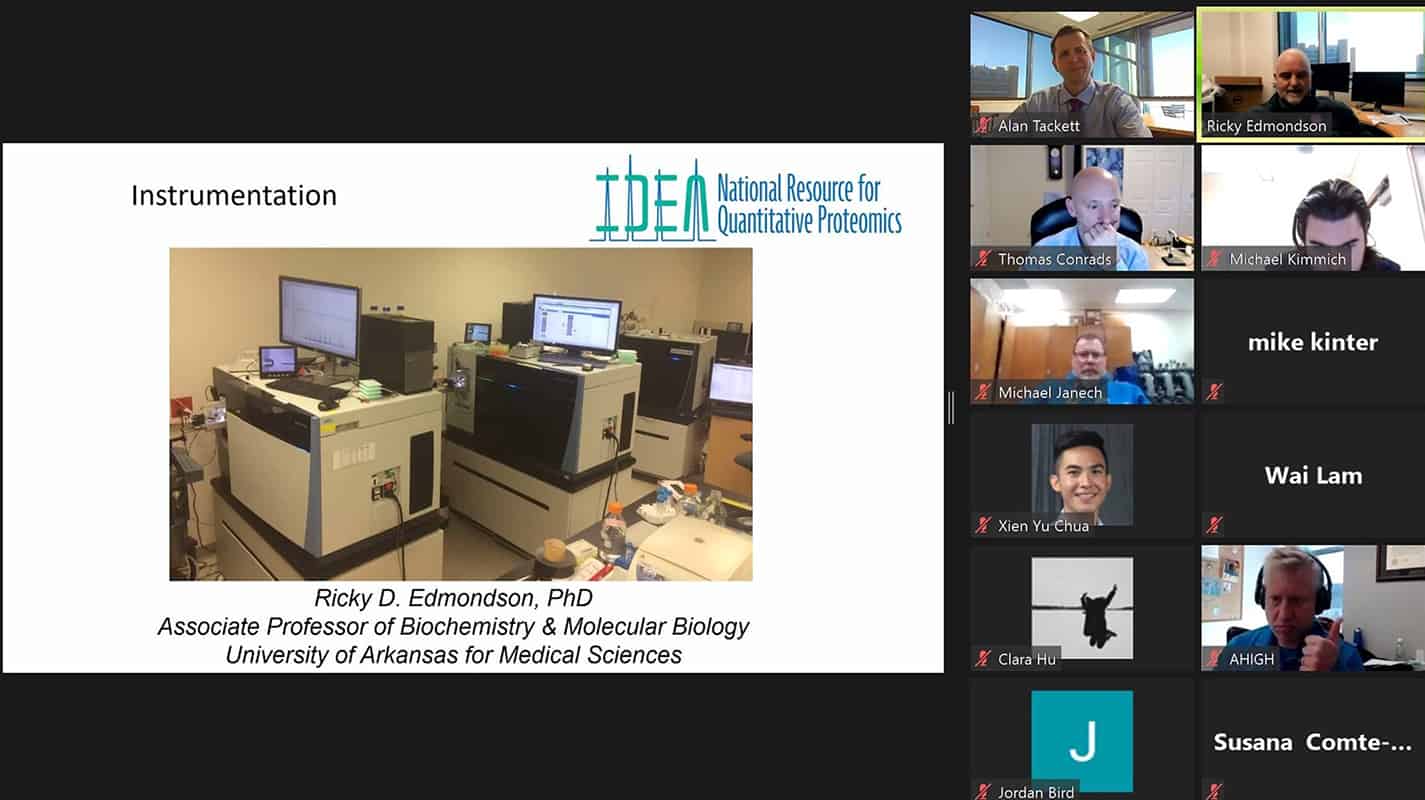National Proteomics Symposium Draws Leading Scientists Studying Proteins
| Biomedical research begins with scientists identifying, analyzing and comparing proteins in biological samples. The complex process requires facilities known as proteomics cores filled with specialized equipment and highly trained staff.
The fifth annual Proteomics Facility Staff Symposium on Feb. 2, held virtually by the University of Arkansas for Medical Sciences (UAMS), brought together 36 proteomics core directors and staff members to learn more about operating and maintaining these facilities at their institutions.
All of the participants came from IDeA (Institutional Development Award) states and Puerto Rico, all of which have been identified by the National Institutes of Health as historically receiving less grant funding for biomedical research than other states.
“In its fifth year, this symposium brings together scientists from across the entire nation to discuss state-of-the-art methods for using proteomics to study and identify therapeutic vulnerabilities for many diseases including cancer,” said Alan Tackett, Ph.D., deputy director of the UAMS Winthrop P. Rockefeller Cancer Institute.
Tackett also serves as co-director of the IDeA National Resource for Quantitative Proteomics, a partnership between the Arkansas INBRE (IDeA Networks of Biomedical Research Excellence) and Oklahoma INBRE.
The national resource combines the strengths of the two INBREs to guide and assist other IDeA states where core facilities may be underfunded or lack resources.
“At UAMS, in 2020 we were funded as a National Institutes of Health National Resource for Quantitative Proteomics – the first such resource in Arkansas, which provides experienced staff to host this symposium and to provide expert guidance to scientists across the United States,” Tackett said.
Mike Kinter, Ph.D., of the University of Oklahoma Health Sciences Center, serves as co-director of the national resource with Tackett.
The INBRE program supports research in public aIDnd private four-year colleges by building research capacity and raising awareness about career opportunities in biomedical research. It is supported by the National Institutes of Health (NIH) Institutional Development Award (IDeA), established to broaden the geographic distribution of NIH funding for biomedical and behavioral research.
Lawrence Cornett, Ph.D., professor in the UAMS College of Medicine Department of Physiology and Biophysics, serves as principal investigator and director of Arkansas INBRE.
Symposium participants took part in virtual breakout sessions and heard speakers on new instrumentation, COVID-19 challenges and new data analysis techniques. Leading the sessions were Tackett; Rick Edmondson, Ph.D.; Aaron Storey, Ph.D.; and Sam Mackintosh, Ph.D., all from the UAMS College of Medicine Department of Biochemistry and Molecular Biology.
“We covered a wide range of topics to help core directors and staff develop and maintain programs that will succeed at their universities,” said Tackett.
The Proteomics Core at UAMS is one of several core facilities where technology, tools and collaborative services are pooled together and available on a pay-per-use basis to investigators both within and outside of UAMS who may not otherwise have access to them in their individual labs.
In the Proteomics Core, staff use a process known as mass spectrometry to help researchers identify proteins. The core is a one-stop shop, where staff not only process the samples but can help researchers design experiments and analyze results.
Oklahoma INBRE co-hosted an additional virtual workshop with Arkansas INBRE on Feb. 9-10 with a second one planned. The workshops covered targeted proteomics, which is the complement to discovery proteomics. Topics include the basics of mass spectrometry and proteomics, designing an effective proteomics experiment and analyzing data.
A virtual Discovery-Phase Proteomics Faculty and Student Workshop takes place Feb. 23-24. It will emphasize new approaches that researchers can implement in their own laboratories and how to best use the resulting data to be more competitive for ext
